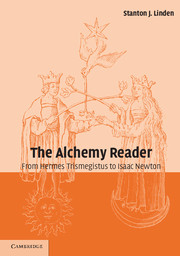Introduction
Published online by Cambridge University Press: 05 October 2014
Summary
Writing nearly seventy years ago about the then-emerging academic interest in alchemy stimulated by Marcellin Berthelot's translation and editing of ancient Graeco-Egyptian texts, Arthur John Hopkins drew attention to certain problems in the study of alchemy that remain largely unresolved today: “A comprehensive explanation [is] still lacking,” Hopkins noted, “such a theory as would coordinate the whole and make clear to the modern mind what was the purpose and underlying conception of the alchemist.” Subsequent years have witnessed growing interest, research, and scholarly activity devoted to alchemy, hermeticism, and related fields, none more than at the present time with its steady flow of new editions of primary texts, new critical books and articles, and the appearance of new journals and specialized conferences and colloquia devoted to these subjects. Furthermore, a visit to virtually any bookshop reveals that there continues to be a large – and steadily increasing – popular and semi-popular market for these diverse materials.
Two related characteristics mark the academic, research-oriented side of this burgeoning enterprise: its interdisciplinary nature and its tendency to reassess and reinterpret, often radically, the authors, works, and ideas that are its focus, often with the result of discovering a high level of alchemical and hermetic interest where previously it had not been suspected or at least readily admitted. This is seen, for example, in the continuing reevaluation of the role of alchemy in the scientific thought of Robert Boyle and Isaac Newton, which has demonstrated conclusively that, much more than an early or casual interest, alchemy was at the heart of the thought and method of each of these pioneers of modern science.
- Type
- Chapter
- Information
- The Alchemy ReaderFrom Hermes Trismegistus to Isaac Newton, pp. 1 - 24Publisher: Cambridge University PressPrint publication year: 2003



